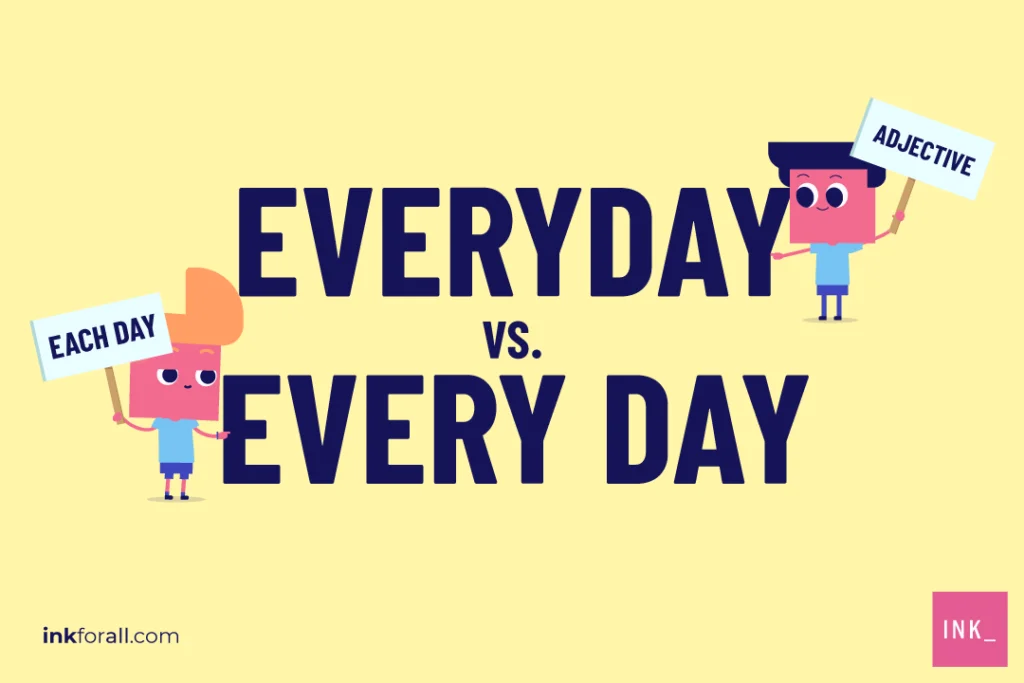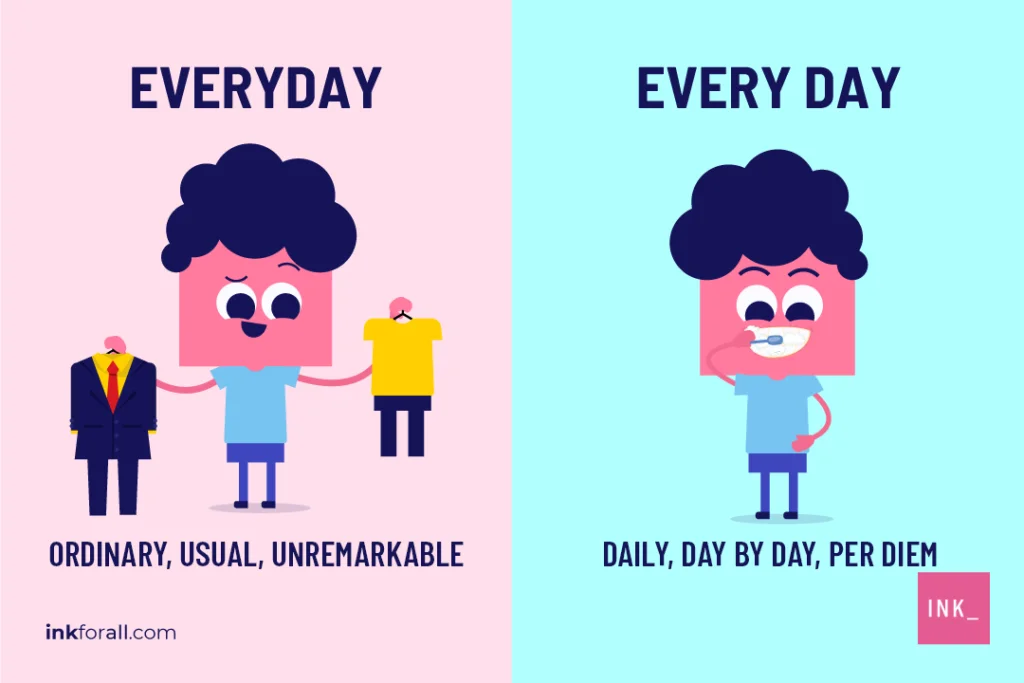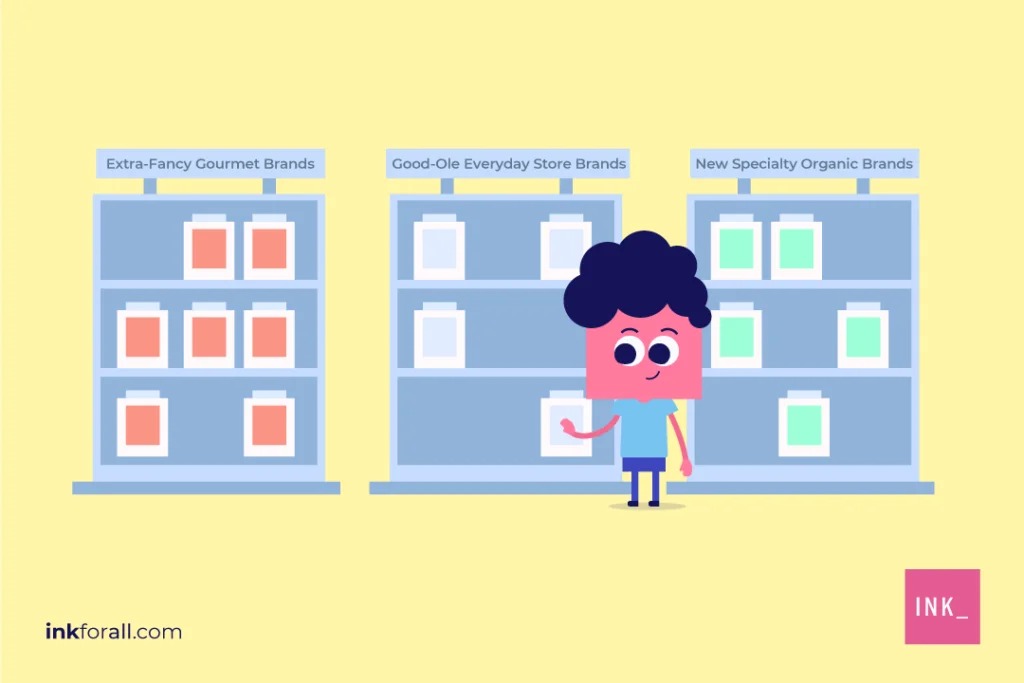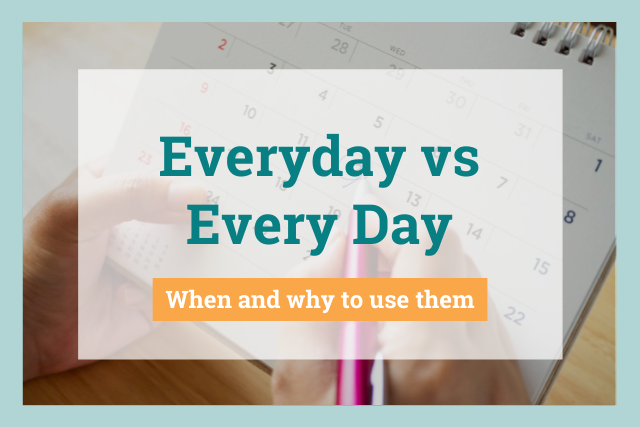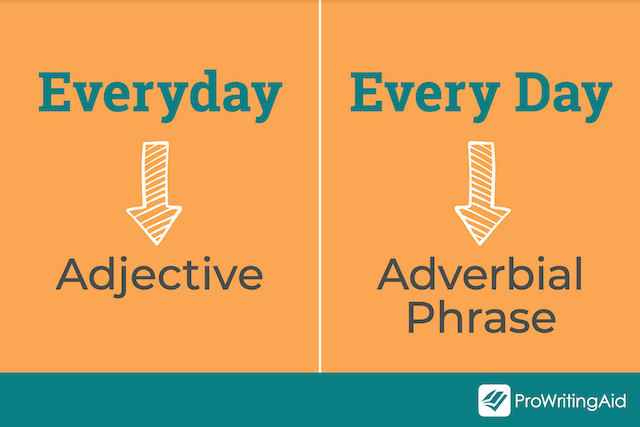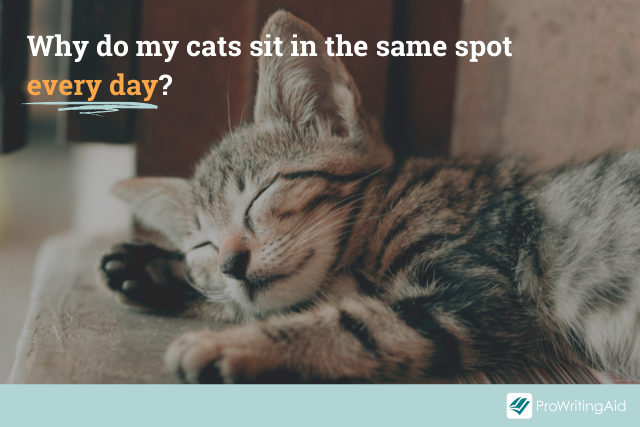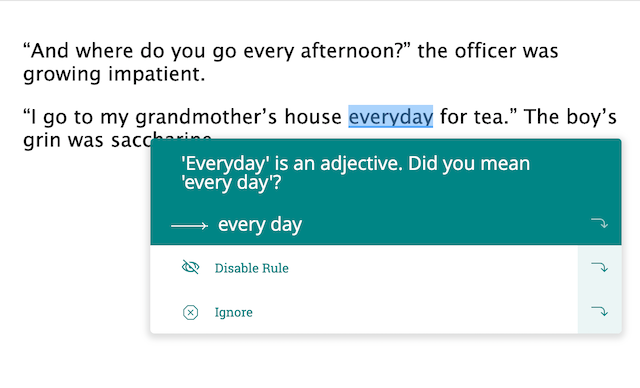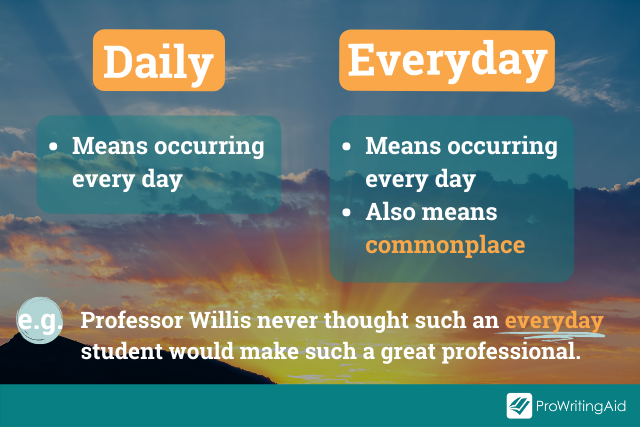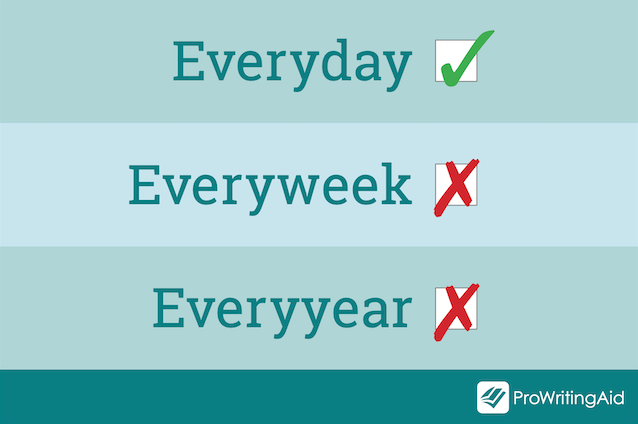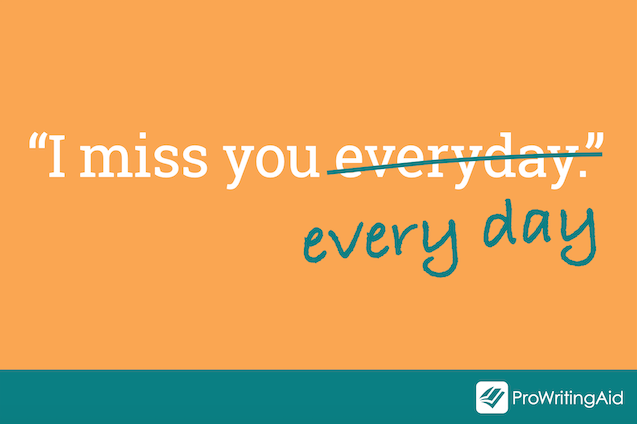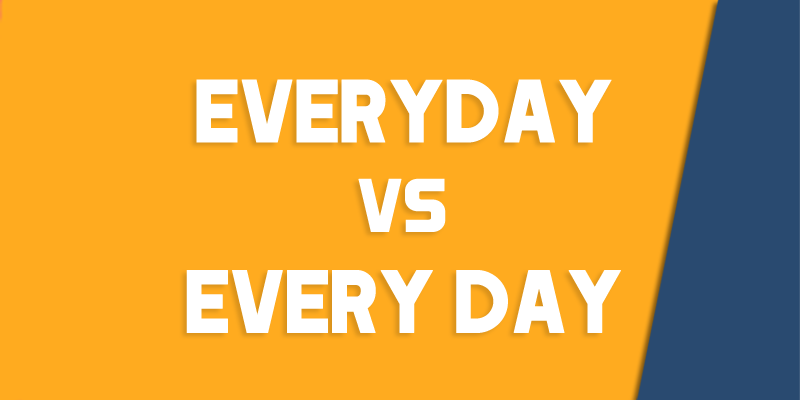Here are “Everyday” Tips You Can Use “Every Day”
powered by
LanguageTool
“Everyday” and “every day” are not interchangeable. We’ll explain the difference between these two words and teach you how to use them correctly.
What is the difference between “everyday” and “every day”?
- Everyday is an adjective that means “used or seen daily,” “ordinary” or “commonplace” (e.g., I brought my everyday clothing). Every day is a two-word adverb phrase that means “each day” or “daily” (e.g., We read every day).
If you find yourself asking, “Is it everyday or every day?,” you aren’t alone. Many people use these words incorrectly. It comes down to this: if you do something every day, it becomes an everyday habit. Still puzzled? Don’t worry. Below, we’ll elaborate on what these words mean, and show you a trick to remember how to use them correctly every day.
How To Use “Everyday”
Everyday is a single word that means “encountered daily,” “used routinely,” or “commonplace.” It’s an adjective, which means it describes or modifies nouns.
My mom told me to pack my everyday shoes for our upcoming vacation.
In this example sentence, everyday modifies the noun shoes. Everyday is synonymous with ordinary or usual. Therefore, the example sentence above has the same message as:
My mom told me to pack my usual shoes for our upcoming vacation.
Other words you can use in place of everyday are:
- standard
- routine
- ordinary
Here are some more examples of everyday used in a sentence:
Everyday tasks can become monotonous.
My grandma prided herself in coming up with easy, everyday recipes.
One of the most important things my mentor taught me is not to stress over minor, everyday problems.
How To Use “Every Day”
Every is an adjective, while day is a noun. Together, they make a two-word adverb phrase that means “daily” or “each day.” Whereas the adjective everyday usually comes before a noun, the adverb phrase every day is typically seen after a verb.
My teammates and I practice every day.
In the sentence above, practice is the verb that is getting modified.
Here are a few more examples of every day in a sentence:
Fortunately, my mom doesn’t make me do chores every day.
Mr. Lewis assigns homework every day.
Every day, Mr. Whiskers waits by the door until my husband gets home.
How To Remember When To Use “Everyday” and “Every Day”
We get it. The similarities between everyday and every day mean they are easy to confuse. There are two simple tests to make sure you’re using the correct word.
The first is to replace the word in question with each day. If it still makes sense, then every day is the word you want to use.
They feed the ducks by the lake every day.
They feed the ducks by the lake each day.
Both sentences above make sense.
We were discussing everyday scenarios.
We were discussing each day scenarios.
Here, the last sentence isn’t grammatically correct, and therefore you would know that the word you should use is everyday.
Another test you can use is to add the word “single” between every and day.
We talked on the phone every day after school.
We talked on the phone every single day after school.
Because every single day makes sense in the sentence above, then every day is the correct option to use.
I was told to consider my everyday habits before I make my decision.
I was told to consider my every single day habits before I make my decision.
Using every single day in the sentence above doesn’t fit as well, so you would know to use everyday instead.
Even if you’re acutely aware of the differences between two words, typos happen every day. It’s better to play it safe by using LanguageTool as your writing assistant. Not only will it correct spelling and grammar mistakes as you type, but it will also provide synonyms and offer stylistic improvements.
everyday — перевод на русский
/ˈɛvrɪdeɪ/

You can have one everyday.
— Ты можешь каждый день.
You know that old man who rides a horse everyday? It was him.
— Старик, который каждый день ездит на лошади.
He’ll give me a ride everyday.
Он будет катать меня каждый день.
And he’ll give me a ride everyday.
И он будет катать меня каждый день.
You’re having fun everyday.
Ты весело проводишь время каждый день.
Показать ещё примеры для «каждый день»…
Stosstrupp 1917, one of the first films about everyday life at the front in the First World War, when shown in theatres, immediately drew the attention of millions of cinemagoers.
Stosstrupp 1917, один из первых фильмов о повседневной жизни на фронте в Первую Мировую, который демонстрировался в кинотеатрах, сразу привлек внимание миллионов зрителей
But one can’t live everyday life with… I don’t know —
Но я не могу жить повседневной жизнью… ну, не знаю…
From everyday life one rises to a life —
От повседневной жизни мы переходим к жизни, скажем, высшей.
Even if it is degraded by everyday life.
Даже если оно часть повседневной жизни.
Louise confidently opposes the folly of love with everyday life.
Луиза противопоставляет безумство любви повседневной жизни.
Показать ещё примеры для «повседневной»…
My heart is dying inside everyday when there is an attack…
Мое сердце ежедневно замирает, когда начинается атака…
Everyday we’re stained black with oil.
Ежедневно мы измазываемся черной нефтью.
You are still capable of being amazed by the way in which the combination, according to a few ultimately very simple rules, of thirty or so typographic signs is able to generate, everyday, these thousands of messages.
Тебя всё ещё удивляет, что комбинируя по очень простым правилам всего лишь три десятка типографских знаков, можно ежедневно составлять эти тысячи сообщений.
I see you workin’ at Hanson’s everyday.
Видел, что вы ежедневно работаете у Хэнсона.
You have to exercise everyday,
Надо ежедневно тренироваться.
Показать ещё примеры для «ежедневно»…
I just figured it was your everyday vamp high jinks.
Мне показалось, что эти обычные вампиры просто развлекались.
I can’t believe the Griffins eat here like everyday people.
Я не могу поверить — Гриффины здесь едят как обычные люди.
They were all science types. These weren’t everyday kidnappings.
Они все были учеными, и, будто бы, это не были обычные похищения.
You know, everyday stuff.
Обычные вещи.
Guys, I don’t think we’re eating… your everyday garden-variety guacamole.
Чуваки, не думаю, что то, что мы едим сейчас, есть самые обычные чипсы.
Показать ещё примеры для «обычные»…
After all, I’m your everyday cold-assed, supercilious English woman.
В конце концов, я твоя каждодневная хладнокровная, надменная англичанка.
It’s not your everyday chicken gruel.
Это не твоя каждодневная куриная каша.
Just your average, typical, everyday wednesday.
Просто твоя обыкновенная, типичная, каждодневная среда.
Um, when just the whole everyday thing would drive me crazy.
Ммм… Когда каждодневная суета сводила меня с ума.
And though, when in 1935 he goes back to Romania, Cioran is contaminated by the vision towards which, history is made with nations awakened from numbness, and with visionaries capable to introduce the absolute in their everyday breath.
И всё же, когда в 1935 году Чоран возвращается в свою страну, он заражён идеей, согласно которой история делается народами, пробуждёнными от оцепенения и способными внести абсолют в своё каждодневное дыхание.
Показать ещё примеры для «каждодневная»…
I had to write about everyday life in Germany, our past enemy and future ally.
Я должен был написать ряд статей о жизни в Германии, нашем вчерашнем враге и нашем завтрашнем союзнике.
Keep on digging the soil of everyday life.
О том, он должен был копать до конца своей жизни.
A tug or two, and it unravels to reveal how empty our everyday lives really are.
Рывок или два и она расходится, показывая сколь на самом деле пусты наши жизни.
I was someone she could talk to outside of her everyday life.
Вероятно, я был тем, с кем она могла поговорить о жизни.
So it’s a lot of changes in everyday life.
Так что в нашей жизни произошло много перемен.
Показать ещё примеры для «жизни»…
It borrows from everyday life and plays out its own fantasy.
Он берёт кусочки обыденной жизни и превращает их в собственные фантазии. Этот сон у меня был до того, как она приехала в Камелот.
The knowledge that I’m giving you this gift, this opportunity to transcend your everyday suburban existence and have sex with a fucking rock star, thereby giving you a story to dine out on for years to come, that’s the fun bit for me.
Осознание того, что я даю тебе этот дар, эту возможность выйти за пределы своей обыденной жизни и заняться сексом с охуительной рок-звездой, о чём ты сможешь рассказывать всю оставшуюся жизнь, вот удовольствие для меня.
— Yeah, re-appropriation of everyday culture.
— Да, для переосмысления обыденной культуры.
He feels ignored in his everyday life.
Он чувствует, что его не замечают в его обыденной жизни.
20 years later, after graduating from high school in Rovno, when this romantic schoolgirl suddenly appeared on the bumpy road of everyday life — among heat waves, poverty, violence, diapers, migraines, queues, family life disappointments — her childhood promises have been violated, trampled, and even turned into a mockery of life itself.
Спустя 20 лет, после окончания гимназии в Ровно, когда эта романтичная гимназистка вдруг оказались на ухабистой дороге обыденной жизни — среди хамсинов, бедности, насилия, пеленок, мигреней, очередей, разочарований семейной жизни — обещания, которыми одарило её детство, были нарушены, растоптаны,
Показать ещё примеры для «обыденной»…
I’m sorry for shouting at you everyday. I’m sorry for getting angry at you. I said I wanted to give you happiness, but I made you undergo so much suffering.
что постоянно кричу… что злюсь. а причинил только страдания.
She isn’t one of them. She spents the night there everyday.
А эта теперь ночуеттут постоянно…
We used to be so happy but after our son got this condition all we do is fight everyday We don’t understand what happened
Мы всегда были так счастливы, но после того, как это началось с нашим сыном мы постоянно ссоримся.
I longed everyday to beat him to a pulp
Когда-нибудь он у меня получит! Вот о чем я постоянно думал, мечтая его побить.
We’d quarrel everyday and very likely become enemies.
Постоянно ссорились бы и наверняка стали бы врагами.
Показать ещё примеры для «постоянно»…
I was saying that Bach was expressing — The color and the tempo of his music express everyday life.
Я говорил, что Бах выражает… что колорит и темп его музыки выражают повседневность.
— You don’t think it sounds like everyday life?
Ты не находишь, что эта музыка звучит как повседневность?
But then again, for Mary, everyday life is love — it is love —
И потом, любовь это повседневность… для Марии… эта любовь…
Everyday goings calm me.
Повседневность меня успокаивает.
Maggie says we celebrate the everyday.
Мэгги говорит, что мы празднуем повседневность.
Показать ещё примеры для «повседневность»…
Everyday the same story, «Tomorrow»!
Всегда одно и то же: «Завтра!
You’ll want it everyday at The Valley of Love Cabaret
И ты всегда будешь возвращаться В кабаре «Долина любви»
EVERYDAY FURTHER AWAY FROM WHERE I WAS.
ВСЕГДА ЧУТЬ ДАЛЬШЕ ЧЕМ БЫЛА ПРЕЖДЕ.
A villain is not everyday a villain.
Злодей не всегда злодей.
Oh like everyday.
Как и всегда.
Показать ещё примеры для «всегда»…
Отправить комментарий
повседневный, ежедневный, каждодневный, бытовой, обычный, житейский, обиходный
прилагательное ↓
- ежедневный, каждодневный
everyday affairs — ежедневные /повседневные/ дела /занятия/
- обычный, часто встречающийся, повседневный
everyday occurrence — повседневное явление, обычный случай
this was no everyday writer — такие писатели встречаются не каждый день
- будничный; повседневный
clothes for everyday wear — одежда для повседневной носки, повседневная одежда
- шаблонный, избитый
she had only an everyday story to tell — то, что она нам могла рассказать, мы уже не раз слышали
Мои примеры
Словосочетания
the problems and vexations of everyday life — проблемы и невзгоды повседневной жизни 
a videotape of everyday life in Havana — видеозапись повседневной жизни в Гаване 
everyday / plain / simple language — простой, повседневный язык 
everyday accounting — ежедневный учет 
everyday dress — будничное платье 
everyday expenses — мелкие расходы 
everyday goods — товары повседневного спроса 
everyday information — повседневная информация 
everyday language — обыденная речь; обыденный дискурс; обыденный язык; обыденный дискурс 
everyday low price — долгосрочная низкая цена 
everyday matters — текущие дела 
in everyday use — расхожий 
Примеры с переводом
I talk to him practically everyday. 
Я разговариваю с ним практически каждый день.
He painted scenes from everyday life. 
Он рисовал сцены из повседневной жизни.
She bought it for everyday wear. 
Это она купила для повседневной носки.
She naps everyday after lunch for an hour 
Она спит каждый день после обеда в течение часа.
Describe it in ordinary everyday language. 
Опишите это простым повседневным языком.
The details of everyday life can be fascinating. 
Повседневные мелочи жизни бывают весьма интересными.
Don’t let the problems of everyday life get you down. 
Не позволяйте проблемам повседневной жизни вас расстраивать.
ещё 13 примеров свернуть
Примеры, ожидающие перевода
Does big business have more control over our everyday lives than our elected governments? 
Для того чтобы добавить вариант перевода, кликните по иконке ☰, напротив примера.
Возможные однокоренные слова
Main Everyday vs. Every day Takeaways:
- Both everyday and every day are correct, but they mean different things.
- When it’s one word, everyday is an adjective. It describes something that is commonplace or ordinary.
- When it’s two words, every day is the same as saying “each day”. It refers to something that happens daily.
Is Everyday one or two Words?
If you’re trying to say that something is commonplace, then it’s one word. Opt for everyday. Conversely, if you’re trying to describe something that happens daily, then it’s two words. Go for every day. Here’s a quick trick to help you remember the difference and decide which word you need: If you can replace the word with the phrase “each day”, then you need the two-word version of every day. This one always refers to frequency.
Which is Correct: Everyday or Every day?
Both words are correct, but they are not interchangeable. On one hand, everyday is an adjective and means ordinary, average, or commonplace. On the other hand, every day is usually part of an adverbial phrase. It means daily or describes something you do as part of a daily routine.
Every day is a noun phrase that means “each day.”
Everyday functions as an adjective. It describes an action or item that’s commonplace or something that you do as a matter of habit.
Everyday vs. Every day: Compound Word vs. Noun Phrase
If you’re struggling with choosing between everyday and every day, you’re not alone. Everyday vs. every day is just as confusing as a lot vs. alot and anytime vs. any time.
They look the same; they sound the same, so why aren’t they the same?
Visually, the only difference between these two words is a small space. This is what’s responsible for most of the confusion between everyday and every day.
However, grammatically, the difference is a lot larger. It’s the difference between a word and a phrase.
- Everyday is compound word made up of two words.
- Every day is not a compound word. Instead, it’s a simple phrase made up of two words.
Because I love food, I’ll use cheese and bread. Let’s make every the cheese and day the bread.
You can enjoy each food individually. You don’t have to eat together because they work just fine on their own. Similarly, every is a word that functions just fine on its own without day.
But, you can eat them together. Maybe as a quick snack or part of a cheese plate with other items like fruit and cold cuts. In the same way, the individual words every and day can work together to make the phrase everydayas part of a sentence.
What’s more, when you meld cheese and bread together with heat, the combination creates something entirely different: a grilled cheese. This is more similar to fusing everyand day together to form the compound word everyday.
Beyond Everyday: Other Compound Word Examples
For a non-food example, black and bird are two words that can stand alone. Or, you can put them together to form the word blackbird.
Watch Out!Some compound words require a hyphen, but everyday does not.
In each of these examples, the joined words create a different meaning compared to when the words were separated. The same idea applies when using everyday or every day.
Building on the concept of compound words, we see that “every” and “day” can indeed stand alone. But you can combine them into a single word with an entirely different meaning.
The Best Trick for When to use Which Word
The easiest way to keep things straight is to ask yourself whether you’re talking about each day or something commonplace or average.
So, if you can replace everyday or every day with “each day,” you know that you should go with the two-word option.
As for everyday, remember that it’s an adjective. As such, it will almost always come before a noun. We use everyday to describe something ordinary. You can also swap it with its synonyms such as“regular,” “daily,” “familiar,” “conventional,” or “unremarkable.”
Everyday vs. Every day: How to use Them in a Sentence
Examples of “Everyday” in a Sentence
Examples of “Every day” in a Sentence
Use every day when you’re referring to something that happens each day. You’re most likely going to use every day to talk about a daily occurrence. This may be something everyone frequently does, or it could be an action that’s a permanent part of your routine.
So remember: Everyday is an adjective that describes something ordinary, average, or mundane. The phrase every day is the same as “each day.” And the rest, as they say, is gravy.
Is Everyday Written Together? Test Your Skills!
Everyday Question #1
A. Noun
B. Adjective
C. Adverb
D. Verb
Correct!
Wrong!
The answer is B. “Everyday” is an adjective that describes an action or item that’s commonplace or something that you do as a matter of habit.
Every day Question #2
Correct!
Wrong!
The answer is FALSE. “Every day” is a noun phrase that means “each day.”
Everyday vs. Every day Question #3
A. Regular
B. Each day
C. Familiar
D. Conventional
Correct!
Wrong!
The answer is B. You can’t interchange “everyday” and “each day” in a sentence.
Everyday or Every day Question #4
A. She played the piano every day for a year.
B. She played the piano everyday for a year.
Correct!
Wrong!
The answer is A. Use “every day” when talking about something that happens each day.
Everyday vs. Every day Question #5
A. Auditions are an everyday affair for aspiring actors.
B. Auditions are an every day affair for aspiring actors.
Correct!
Wrong!
The answer is A. Use everyday when talking about something that is a regular occurrence.
Read More: Anytime Vs. Any Time: What’s The Correct Word To Use?
Every day I’m shufflin’.
Not only are these classic song lyrics to LMFAO’s “Party Rock Anthem”—they’re also a great way to start this article. The question is, should it be “every day” or “everyday”?
As is so often the case in the English language, it depends. Here, for instance, “every day” as two separate words is the correct usage (kudos to LMFAO).
But in what cases would the proper usage be “everyday”? And how is one to know the difference? Let’s dig deeper.
Everyday vs Every Day: What’s the Difference?
Here’s the key distinction: “everyday” is an adjective, while “every day” is an adverbial phrase.
As you probably already know, adjectives describe nouns. Adverbial phrases are sets of multiple words that function as adverbs, which describe verbs.
So, in our first example, “every day” is correct, since it’s describing the verb shufflin’ (and we could all do a little more shufflin’, couldn’t we?). “Everyday” wouldn’t make sense here, because there’s no valid noun for it to describe.
To give another example, let’s stick with the music theme and consider Sly and the Family Stone’s hit song “Everyday People.” That one’s also correct as written, because “everyday” is an adjective describing the noun people. There’s not even a verb in there to distract us!
How to Use Everyday and Every Day Correctly
In the above examples, we mostly applied logic. But one might employ other methods to get this right.
Start by analyzing your sentence and determining what function “everyday” or “every day” serves. Is it an adjective or an adverbial phrase?
“Why do my cats sit in the same spot [everyday/every day]?”
To determine whether this is an adjective or adverbial phrase, we must first figure out what word is being modified. If it’s a noun, we’re dealing with an adjective; if it’s a verb, we’re dealing with an adverbial phrase.
The nouns in this sentence are “cat” and “spot,” while the verb is “sit.” So which is being modified? Well, let’s look at the sentence from a macro perspective. We’re trying to express that the cats sit in the same spot each day. Since this sentence is a little confusing as constructed, let’s try restructuring it into a statement rather than a question.
“[Everyday/Every day] my cats sit in the same spot.”
Sometimes restructuring is an excellent way to clarify. Here especially our decision becomes clearer. The phrase is modifying the verb “sit,” therefore, we should use the adverbial phrase “every day.” Thus, the sentences read:
- “Every day my cats sit in the same spot”
- “Why do my cats sit in the same spot every day?”
Now let’s try another sentence:
“Your [everyday/every day] worries melt away when you sing karaoke.”
First off, that sentiment is so true. Second, let’s figure out what word is being modified. In one way, this sentence is easier than the last. Since our word comes just before the word “worries”—in this sentence, “worries” is a noun—we should use “everyday.”
Thus, the sentence reads:
“Your everyday worries melt away when you sing karaoke.”
Don’t get too tripped up by the similar meanings of the word and phrase. Though “every day,” describes worries that people have each day, the word “everyday” means the same. Therefore, it’s most important to identify what’s being described—noun or verb.
And now to get really tricky, let’s try a sentence with two instances of “everyday” and “every day”:
“If I have to make this hike [everyday/every day], I think I’ll settle for a more [everyday/every day] set of shoes.”
In the sentence’s first clause, we’re clearly modifying the verb “make,” not the noun “hike.” After all, if we restructure the sentence to, “Every day I make this hike,” it makes sense. If we restructure it to “Everyday hike I make,” it wouldn’t make sense. Therefore, “every day” is the correct choice.
In the sentence’s second clause, the word being modified is the noun “shoes.” We really don’t even need to restructure. Therefore, the correct word is “everyday.” So our final sentence should read…
“If I have to make this hike every day, I think I’ll settle for a more everyday set of shoes.”
There you have it!
How to Remember the Difference
It’s easy to use the wrong word when you’re in the flow of writing. With ProWritingAid, you can be sure you use the right word every time.
The editor will tell you if you’ve used every day when you should have used everyday, and vice versa:
You can correct this and hundreds of other everyday writing errors (see what I did there?) with ProWritingAid.
Can You Start a Sentence with “Every Day” or “Everyday”?
Sure, so long as the sentence still follows the rules we’ve laid out here. A few examples of “everyday”:
- Everyday players get fatigued faster than professional players.
- Everyday events like this never make the news.
- Everyday heroes like you deserve more attention!
The same goes for “every day.” Some more examples:
- Every day I have the blues.
- Every day is a gift.
- Every day that dog barks at me!
You might even try throwing both in one sentence, just to be tricky.
- Everyday concerns like these shouldn’t haunt me every day.
- Every day you tell me about these everyday issues. When are you going to find help?
- Everyday fruits and vegetables, like bananas and carrots, should be eaten every day.
When to Use Everyday and Every Day: Common Examples
Looking for a specific example of when to use every day and everyday? We’ve got you covered. Find the answers to some of the most common questions below.
Is There Any Difference Between “Daily” and “Everyday”?
Glad you asked. Yes!
Some may think “daily” and “everyday” are synonyms, but they aren’t quite the same in every instance.
“Daily” pretty much means the same thing every time: occurring every day. “Everyday” might mean the same (“everyday delivery,” for instance), but it also means “commonplace.” Take this sentence, for example:
“Professor Willis never thought such an everyday student would make such a great professional.”
For many, such differences might seem unimportant. But for writers like you and I, who need the exact right word for every instance, it’s important to learn these distinctions. Consider the context of the sentence you’re writing, then use the word that most accurately fits your description.
What Is the Difference Between “Every Day” and “Day by Day”?
This is another subtle difference, but one that should prove important. “Every day” of course means each day throughout a duration. “Day by day” is a more archaic phrase, and therefore one you won’t hear quite as often. It refers more to a tedious passage of time. Here are some examples:
- Day by day, Ronald’s condition worsens. I fear we may have to close McDonald’s.
- Things are bad now, but they’ll get better, day by day.
- Freshman year was tough, but day by day, Wally soldiered on.
As you can see, substituting the phrase “every day” in any of these sentences loses the effect of a long time elapsing. If you want that eternity-passing-slowly sort of feeling, opt for “day by day.”
Why Is “Everyday” a Single Word and Not “Every Week” and “Every Year”?
This is a question many writers ask, and it’s a good one. I’ve never seen the words “everyweek” or “everyyear,” have you? I’m guessing not, because my spellchecker is furious at me right now.
The reason is, of course, that “every week” and “every year” are analogous to “every day,” not “everyday.” These too are verbal phrases, so they modify verbs. Since “everyday” is an adjective, it modifies nouns. Consider these sentences:
- Ellie goes to the doctor every year, though she doesn’t enjoy it.
- Leslie plays poker every week. (She’s one of the dogs in the famous picture.)
- I practice singing Bruce Springsteen’s “Santa Claus is Coming to Town” every week so I can sing it really well at my Christmas party every year.
(That last example may or may not be autobiographical.)
There’s rarely any need to combine these adverbial phrases into one word. However, if you really want to turn “every week” or “every year” into an adjective, make sure you use a hyphen.
- These every-week tests are killing me.
- Hey, we should turn this into an every-year vacation destination.
Why Is “Everyday/Every Day” One or Two Words But “Every Night” is Always Two?
As noted, “everyday” is a word that confuses many people because it’s so similar to an existing verbal phrase. Therefore, many people expect it to have analogous meaning. The answer is very similar to the previous question.
“Every night” makes sense as a phrase because it basically means each night. For example…
“Every night I turn into a werewolf. Please don’t tell my mom.”
If we combined this verbal phrase into a single adjective, it would need some new meaning that we don’t yet have. After all, “everyday” means commonplace, so what would “everynight” mean? I suppose you could use the hyphen again…
“My werewolf transformation is an every-night affair.”
But that usually comes out a little awkward. “Every night” is almost always best.
Would You Say, “I Miss You Every Day” or “I Miss You Everyday”?
Let’s restructure this sentence for help in determining what word is being modified.
“[Everyday/every day] I miss you.”
Which word is being modified: “miss” or “you”? It’s the former, since the meaning of the sentence is essentially “each day I miss you.” It’s clearly not the latter, since we’re not implying the “you” in this sentence is commonplace.
So, the correct constructions are:
- “Every day I miss you.”
- “I miss you every day.”
What Does “All Day, Every Day” Mean?
This is a common idiom that’s kind of redundant, yet admittedly fun to say. It’s usually used to underscore the consistency of a person’s work ethic, like in the following examples:
- All day, every day, Steph Curry plays his heart out.
- Listen, kid. You just gotta put your head down and work hard, all day, every day.
- Question: “Will you be here tomorrow?” Answer: “All day, every day.”
Just make sure to avoid writing “all day, everyday,” because as you probably know, that’s incorrect. That phrase would suggest the day is mundane all the time—or something. It clearly doesn’t make much sense, so don’t do it!
What Is the Difference Between “Every Day” and “Every Single Day”?
Honestly, the latter phrase is a little superfluous. “Single” isn’t really necessary, since it’s an extra word that doesn’t add much meaning to the phrase. However, “every single day” is used colloquially, especially when people are trying to make a point. Try keeping it in dialogue, like in the following examples:
- “Every single day you ask me that question. When is it going to end!?”
- “Do you still think about that moment? Because I do. Every. Single. Day.”
- “Look, I’m sure Bob is fine. It’s not like he gets abducted by aliens every single day, right? It just happens a few times a year.”
What Is the Difference Between “Everyday”/“Every Day” and “Anybody”/“Any Body”?
“Anybody” is a pronoun that simply means “anyone,” whereas “any body” are two distinct words. Unlike “every day,” “any body” is not an adverbial phrase.
If you’re unsure of whether to use “anybody” or “any body,” try substituting the word “anyone.” If the sentence still makes sense, “anybody” is correct. If it doesn’t, “any body” might be correct. For instance:
“Did [anybody/any body] hear what I just said?”
Let’s substitute with the synonym “anyone”:
“Did anyone hear what I just said?”
That makes perfect sense, so “anybody” is correct. And never forget: context matters. Just look at this example:
“I didn’t see [anybody/any body] at the ice cream stand. Did you?”
Using “any body” in this sentence implies someone was murdered at the ice cream stand, and then their body was hauled away. Probably not what the author meant.
In Conclusion
We hope this article helps you identify when it’s correct to use “every day” and “everyday.” For those gray areas, or if you’d just prefer to focus on writing, try ProWritingAid’s grammar reports. Not only will it help you select the correct everyday or every day—it’ll also catch potential problems like confused words, missing punctuation, and sentence fragments.
Now get out there and write, writer!
Now is a wonderful time to be a copywriter. Download this free book to learn how:
This guide breaks down the three essential steps you must take if you think copywriting is the career for you.

How do you use everyday or every day?
Everyday is an adjective we use to describe something that’s seen or used every day. It means “ordinary” or “typical.” Every day is a phrase that simply means “each day.”
Can you start a sentence with every day?
It is very common to start a sentence with a time phrase, such as Every day, Usually, Sometimes, etc. Yes, you can. For example: “Every day is a good day”.
How do you use the word everyday?
Everyday is an adjective A noun almost always follows the word everyday in a sentence. The only exception is if the noun has other adjectives that describe it. For example, in the sentence “She couldn’t find her everyday black shoes,” everyday comes before the adjective black, but both describe the noun shoes.
What is an everyday example?
The definition of everyday is daily or is something ordinary, regularly used or not fancy. An example of something everyday is your morning routine. An example of something everyday is a dish that isn’t saved for special guests. adjective.
How is everyday written?
The adjective “everyday” (written as one word) means routine, ordinary, or commonplace. The word often directly precedes the noun it modifies, such as when we say that something is an “everyday activity” or an “everyday habit.”
What are the common feelings to the usual routines of you everyday life?
There are various feelings that can be felt when going about with the usual routines of everyday life. The first is satisfaction because you are able to do the tasks you set for the day. It also comes with gratefulness that we ares still alive. When the routines become boring, we also get tired.
What are good daily routines?
Here are 10 daily habits of the most productive leaders, all of which you can implement into your own life:
- Get Enough Sleep.
- Rise Early.
- Meditate Daily.
- Workout (No Matter How You Do It)
- Eat A Good Breakfast.
- Take A Nap.
- Don’t Waste Time Commuting.
- Take Breaks To Re-energize.
What were the five routines or reaction?
1) watching tv continuously without break. 2) playing games like pubg or free fire all the time. 3) By not all listening to the online classes. 4) always playing or studying.
How do you write a daily routine paragraph?
I always wake up at 7 o’clock in the morning then I wash my face and brush my teeth. After that, I do some exercises then I put my clothes on and prepare my school bag. Next, I have my breakfast and wait for the school bus. At 8 o’clock I go to school and start my first class then I go to the second class.
How can I write paragraph?
5 Tips for Structuring and Writing Better Paragraphs
- Make the first sentence of your topic sentence.
- Provide support via the middle sentences.
- Make your last sentence a conclusion or transition.
- Know when to start a new paragraph.
- Use transition words.
What is your hobby paragraph?
Paragraph on My Hobby: Hobbies are a great way to relax and unwind. These are done after a stressful day at school, college, or office. There is no rule of what can be termed as a hobby. It could be anything, from stamp collection to painting, or even travelling.
How do you start an interest essay?
The outline should be formatted to have at least two or three supporting paragraphs for the statement. These paragraphs should incorporate your personal interests and career goals related to your statement. Include a few personal experiences and a few facts you uncovered through research. Write a rough draft.
What is your hobby best answer?
Here are the best ‘what are your hobbies’ example answers: “My hobbies are reading books and working out. Along with this, I also like cooking. While researching the company, I got to know about the in-house gym.
What are your hobbies examples?
Examples of top 15 best hobbies and personal interests to put on a resume:
- Volunteering and community involvement.
- Writing.
- Blogging.
- Podcasting.
- Marketing.
- Learning languages.
- Photography.
- Travel.
What is your hobby and why?
Sample Answer 9: For a fresher with interest in sports “One of my hobbies is playing club sports. Playing sports is my favorite pastime and my hobby because it’s not just the games I love, but also the socializing part that comes with it. I love to meet new people and go to new places for tournaments.”
What is your passion examples?
Here are 16 of the most popular passions.
- Animals. Animals and pets serve as a comforting escape for so many people.
- Yourself. You will spend the rest of your life with yourself!
- Hobbies.
- Art.
- Uplifting Others.
- Learning.
- Health And Fitness.
- Your Career.
How do I say I am passionate about something?
The spark
- Focus on: describing your passion.
- Try this: I love [describe your passion]. I love doing this because [talk about what excites you and what you find rewarding about it].
- Example: I love helping people who want to get published, improve their writing or change careers to become a writer.
How do I express my passion for work?
Ready to show your passion in a job interview? Try these strategies:
- Start off strong. Zavo recommends displaying passion from the get-go with a thoughtful answer to the obligatory interview question, “Tell me about yourself.”
- Ask great questions.
- Go the extra mile.
- Reiterate interest afterward.
What are some examples of professional skills?
Here are several examples of popular soft and hard skills employers may be seeking:
- Active listening skills.
- Communication skills.
- Computer skills.
- Customer service skills.
- Interpersonal skills.
- Leadership skills.
- Management skills.
- Problem-solving skills.
What is a stronger word for passionate?
Some common synonyms of passionate are ardent, fervent, fervid, impassioned, and perfervid.
What’s a strong word?
firm, heavy, vigorous, secure, tough, capable, solid, big, forceful, able, steady, tenacious, athletic, substantial, stable, active, robust, durable, energetic, steadfast.
How do you show passion in writing?
Write a Book with Passion
- Make your work a labor of love. Each time you sit down to write, remember the passion that’s at the source of your work.
- Make your words jump off the page. You want people to be as excited about reading your work as you are about sharing it.
- Make it personal. Don’t just write facts.
What does it mean to write with passion?
Passion is defined as an intense emotion, a compelling feeling, enthusiasm, or desire for, or to pursue something. Passion fuels the long hours writers spend exploring and researching characters, plots and setting. It provides the writer confidence when faced with the endless editing and criticism their work attracts.
Why is it important to write with passion?
Here’s why passion will help you succeed: You’ll put in the hours to learn the craft. You’ll be energized to work towards your big writing dreams. You’ll keep writing even when you don’t see results.
Everyday vs. Every day – What’s the Gist?
These two similar terms are often confused and mistakenly interchanged. Since each one is a different part of speech; they’re not interchangeable.
- Everyday is an adjective.
- Every day is an adverbial phrase.
Adjectives only modify nouns and pronouns. Adverbs, on the other hand, modify verbs, adjectives, other adverbs, and verbals.
How to Use Everyday in a Sentence
Everyday definition: The adjective everyday means to encounter or to use routinely, or to be ordinary.
For example:
- For most mealtimes, the family used its everyday dishes. (Adjective)
- Knowing several tricks and many words, she wasn’t your average, everyday dog. (Adjective)
Note in the above examples that the word everyday comes before the noun it modifies.
How to Use Every day in a Sentence
Every day definition: The phrase every day is an adverb, which is likely telling when something occurred. Adverbs answer questions like How? When? Where? To what extent/degree? of the words they describe.
For example:
- To maintain good health, the man took a walk every day. (Adverb)
- Every day the toddler looked forward to the video call from her grandmother. (Adverb)
In the examples above, the adverb phrase every day is not in front of the word it modifies. In the first sentence, every day describes the verb took by saying when he walks. The second sentence, the phrase every day modifies the predicate looked also by saying when she looks.
By the way, a phrase is when you have two or more words but don’t have a subject and a predicate. Any group of words that has a subject and a predicate is called a clause.
Outside Examples of Everyday vs. Every day
- With its menagerie of adorable anthropomorphic neighbors, its stubbornly sunshiny aesthetic (even when it rains) and its strangely seductive mimicry of everyday life, the Animal Crossing experience is an irresistible mix of distraction, diversion and what sure feels like productivity. –The Washington Post
- Exploring diverse stories featuring underrepresented children while “Together at Home” contributes to a future where all kids can imagine themselves as the everyday superheroes we need. –Chicago Tribune
- Annamaria Iakovou is a pulmonary and critical care doctor for Northwell Health fighting the coronavirus pandemic every day at the North Shore University Hospital in New York. –USA Today
- “For the first couple of weeks, we cooked every single night. But now we mix in support for our diners and restaurants to keep our sanity from cooking every day, while we support the economy with the places that need the help,” Longstreet said. –Houston Chronicle
Phrases That Use Everyday and Every day
There are a few phrases and idioms that use the word everyday or every day, including:
Everyday clothes: Ordinary clothes that are worn around the house.
- After he got home from school, his mother reminded him to change into his everyday clothes.
Everyday English: Words that are used in typical, daily conversation in the English language.
- Native speakers are unaware how often idioms are used in everyday English.
All day and every day: An action or event that occurs frequently.
- She played the game Animal Crossing all day and every day.
Make every day count: To make each day have meaning and purpose.
- After his near-death experience, he vowed to make every day count.
How to Remember These Words
These two terms are easily confused because they are spelled exactly the same way. It boils down to what part of speech you want to use. To help you remember, try these suggestions.
With the adjective everyday describing something routinely encountered, think of the phrase close encounter. In a sense, the word everyday is a close encounter since there is no space separating the two words.
On the other hand, think of the adverbial phrase every day in terms of each day. You would never put “eachday” together, so don’t put every day together when it is an adverb describing when.
Quiz: Everyday or Every day
- She woke up _______ with a happy attitude.
- During the lockdown, he developed an _______ routine.
- It rained _______ for a week.
- Because of much use, the _______ dishes needed to be replaced.
Article Summary
Is everyday or every day correct? Knowing the part of speech you want will make the right choice easier.
If you are looking for an adjective describing something routine or ordinary, pick everyday. If you are looking for an adverb that answers the question when, choose every day.
Getting up every day is an everyday event.
- Everyday is an adjective.
- Every day is an adverb.
Quiz Answers
- Every day.
- Everyday.
- Every day.
- Everyday.
Contents
- 1 Everyday vs. Every day – What’s the Gist?
- 2 How to Use Everyday in a Sentence
- 3 How to Use Every day in a Sentence
- 4 Outside Examples of Everyday vs. Every day
- 5 Phrases That Use Everyday and Every day
- 6 How to Remember These Words
- 7 Quiz: Everyday or Every day
- 8 Article Summary
Everyday vs. Every Day: How to Choose the Right Word
One is an adjective, the other an adverbial phrase
Updated on March 10, 2019
The space between two words can make a big difference: «Everyday» doesn’t mean the same thing as «every day.» Like «anyone» and «any one» or «anytime» and «any time,» these two terms sound exactly the same and are often confused, though one is strictly an adjective and the other is an adverbial phrase.
How to Use «Everyday»
The adjective «everyday» (written as one word) means routine, ordinary, or commonplace. It’s frequently paired with the word «occurrence» to describe something mundane. The word often directly precedes the noun it modifies, such as when we say that something is an «everyday activity» or an «everyday habit.»
How to Use «Every Day»
«Every day» (written as two words) is an adverbial phrase—a group of words that functions as an adverb—that means «each day» or «daily.» It’s used to refer to repeated actions or occurrences. Unlike the adjective «everyday,» «every day» usually follows the verb it modifies, such as when we say that we «exercise every day» or «read the newspaper every day.»
Examples
Though «everyday» and «every day» have related meanings, they are different parts of speech, and you can usually tell which one is appropriate to use by looking at the context. As an adjective, «everyday» is always used to modify nouns:
- When you’re in low spirits, it can be challenging to do even small everyday chores.
- Robert wanted to buy a durable, lightweight jacket for everyday use.
«Every day,» as an adverbial phrase, is always used to modify verbs:
- Every day I watch the evening news to find out about the weather.
- He has to suffer through a long commute every day.
In the first example, «every day» modifies the verb «watch»; in the second, it modifies the verb «suffer.»
How to Remember the Difference
One way to make sure you’re using «every day» correctly is to replace it with the phrase «each day» (or something even more specific such as «every Monday»). If you can do so, you’ve used the expression correctly:
- Every day I watch the evening news to find out about the weather.
- Each day I watch the evening news to find out about the weather.
If you can’t replace the word with «each day,» then you need to use «everyday» instead:
- Robert wanted to buy a durable, lightweight jacket for everyday use.
- Robert wanted to buy a durable, lightweight jacket for each day use.
«Each day» is obviously incorrect; this example calls for an adjective to modify «use.»
Another tip is to insert the adjective «single» between «every» and «day.» If you can do this and the sentence still makes sense, then the two-word «every day» is the appropriate phrase:
- Two words: You have to do your exercises every day.
- «Single» test: You have to do your exercises every single day.
- Adjectival, one word: You have to do your everyday exercises.
- Incorrect change: You have to do your every single day exercises.
Notice how the incorrect change doesn’t make sense as it is written. After reading it, you want to rearrange the words in the correct order.
Language expert Charles Harrington Elster, in his book «The Accidents of Style,» sums up the difference between «every day» and «everyday» quite succinctly: «If something can be used every day, it is suitable for everyday use. Some chores must be done every day, which makes them everyday chores.»
Sources
- Carroll, William. «The Untied Stats on American: And Other Computer Assisted Writing Errors.» iUniverse, Inc., 2005, p. 39.
- Elster, Charles Harrington. «The Accidents of Style: Good Advice on How Not to Write Badly.» St. Martin’s Griffin, 2010, p. 13.
/ / Uncategorized
What’s the Difference Between Everyday and Every day?
Contents
- 1 What’s the Difference Between Everyday and Every day?
- 2 Using Everyday in a Sentence
- 3 Using Every Day in a Sentence
- 4 Remembering Everyday vs. Every day
- 5 Outside Examples
- 6 Quiz: Every day vs. Everyday
- 7 Article Summary
Everyday and every day have the same meaning but they are different parts of speech. This means that they have different grammatical rules and can never be interchanged.
Everyday is an adjective that describes something that occurs daily.
- The toddler’s screaming fits were an everyday occurrence, unfortunately.
Every day is a noun phrase. It means each day.
- The athlete runs every day from 8AM to 9AM.
Now, let’s go over a few ways to use this word and phrase correctly.
Using Everyday in a Sentence
When to use everyday: Everyday is an adjective that describes an event that occurs daily.
For example,
- These shoes aren’t anything special. I use them as my everyday pair.
- It’s common to see cardinals in my backyard. In fact, it’s an everyday occurrence.
There are some common expressions and collocations that use everyday:
- everyday life: normal life with nothing out of the ordinary
- Most people don’t experience emergencies in their everyday life. Rather, emergencies occur rarely.
- everyday activities: activities that happen daily
- Soccer is an everyday activity in this household. On the days the kids don’t have practice, they play with their neighbors in the backyard.
- everyday use: able to be used on a daily basis
- This washing machine wasn’t designed for everyday use. It broke before we even had it for one year.
In addition to meaning daily, everyday can also refer to days that aren’t special. This means, for example, days that aren’t holidays.
Using Every Day in a Sentence
When to use every day: Every day is a noun phrase that is synonymous with each day.
For example,
- It is important to drink eight cups of water every day.
- If you stay in bed too long every day you will start to lose your health.
Every day gives information about time. When it acts as a descriptor of the time it usually appears at the beginning or end of a clause, rather than the middle:
- I run every day and sleep every night. (at the end of the clause I run)
- Every day, the sun rises and she wakes up to go to school. (at the beginning of the clause the sun rises)
This usage shows every day functioning as an adverb phrase.
Remembering Everyday vs. Every day
There is one easy way to remember which word to use and when.
Remember that every day is synonymous with each day. Both of these expressions consist of two different words.
Whenever you are unsure of whether to use everyday or every day, try substituting the expression each day. If it makes sense, use every day. If it looks or sounds wrong, you should use everyday.
Outside Examples
- In our everyday encounters, how we respond to others is determined by how we respond to them emotionally. Verbal cues — the words we string together in spoken utterances — are only part of the story. –New York Post
- Designers have churned out deceptively simple pieces to solve everyday problems. Although these introductions firmly embrace utility, they maintain a refreshing air of flair and whimsy. –Denver Post
- “I drink water all day. Between water and food, it’s driving me crazy,” Snyder said. “They give me X-number bottles of water every day, and I’ve had more water in the last four months than I’ve ever had in my entire life. I’ve also had more food placed in front of me in the same time period.” –The Washington Post
- I wake up every day and say, ‘I’m grateful to have a chance to play. I’m healthy. And just let it fall into place. –Houston Chronicle
Quiz: Every day vs. Everyday
Instructions: Fill in the blanks with the correct word or phrase, either every day or everyday, in the correct form.
- If you want to do a good job on the standardized test it is very important to study __________________.
- She screams ___________________ for incomprehensible reasons because she is grumpy and tired all the time.
- This car was designed for ________________ use. It can withstand all types of weather and bad road conditions, as well as higher than average daily distances.
- She wasn’t surprised when her boss yelled at her for no reason. On the contrary, this was an __________________ occurrence.
- Waking up early, drinking a kale smoothie, and doing 100 situps and 50 pushups was all part of his ___________________ routine.
See answers below.
Article Summary
Should I use everyday or every day? The two spellings sound the same and have the same meaning. However, they are different parts of speech, so they follow different grammatical rules.
- Everyday is an adjective that describes something that happens daily.
- Every day is an adjective and noun together that form a phrase. Usually this phrase functions as an adverb. Use it anytime you could use each day.
Understanding the grammar of both everyday and every day can help you keep them each straight.
Answers
- every day
- every day
- everyday
- everyday
- everyday


